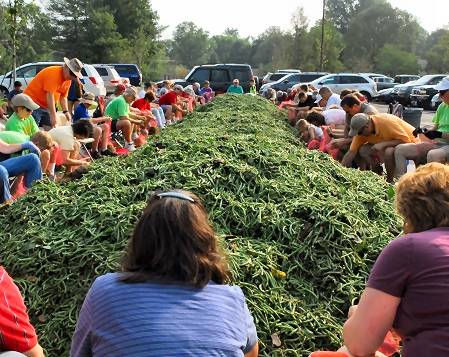By Lynette Johnson *

(July, 2011) Society of St. Andrew volunteers at Concord United Methodist Church in Knoxville, Tennessee **
Take away the noise, the loudest voices, the folks who say, “If only this…” or “If they just…” and what we have is a complex web of issues, nuanced and difficult, with lots and lots of gray and very little black and white.
We could start by looking at hunger by its time frame: immediate, short-term, and long-term.
On the immediate level, for example, hunger is not having access to food to eat today. We can qualify that by talking about whether we mean:
- Not having access to any food at all;
- Not having access to enough food; or
- Not having access to healthy food.
Then we can qualify further, considering whether lack of access is related to:
- Affordability (having enough money to purchase food);
- Availability (being able to find food);
- Transportation (getting to where the food is);
- Time;
- Utility (having the equipment, space, supplemental ingredients, and appropriate storage to prepare food);
- Knowledge (knowing how to prepare and serve food);
- Some other reason or reasons; or
- A combination of reasons
There are at least 47 million hungry people in this country, so immediate solutions are critical. And they are abundant. And themselves a complex web of partial solutions and less-than-ideal make-dos, that still don’t (or can’t) meet all the need that’s out there.
With your help, the Society of St. Andrew is part of that complex web of partial solutions addressing hunger today. And every single day for the foreseeable future. This work is so important, getting healthy food to people in greatest need.
But a single solution cannot address all the issues that comprise the problem of hunger in this country.
As a society, we have to make inroads in addressing ALL of the reasons people are hungry, and we have to do that in a way that ultimately empowers those who are hungry to access healthy food on their own, whenever and wherever they need it—today, tomorrow, and for the rest of their lives.
If there is ever going to be a “fix” to the problem of hunger in the US, it is going to take all of us working together, and all the resources we can marshal among us.
Photo: (July, 2011) Society of St. Andrew volunteers at Concord United Methodist Church in Knoxville, Tennessee, gathered around a 20,000-pound pile of fresh green beans that they bagged to share with hungry neighbors. Their efforts yielded 57,936 servings of beans, distributed in a nine-county area. All these beans represented just two hours of throw-aways from a nearby packing house, discarded because they were too long or too short for sale.
* Lynette Johnson is SoSA’s Director of Church Relations
** Photo above: (July, 2011) Society of St. Andrew volunteers at Concord United Methodist Church in Knoxville, Tennessee, gather around a 20,000-pound pile of fresh green beans that they bagged to share with hungry neighbors. Their efforts yielded 57,936 servings of beans, distributed in a nine-county area. All these beans represented just two hours of throw-aways from a nearby packing house, discarded because they were too long or too short for sale.
AUG
2016

